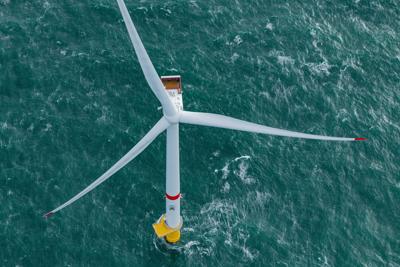A Norwegian company that hoped to build the first wind farm in the Gulf of Mexico has ceased operations and canceled plans to bid for a wind lease area off the coast of southwest Louisiana.
Havfram, an Oslo-based energy company, confirmed this week that its efforts to build “a commercial-scale” wind project in the Gulf evaporated when it shut down Kontiki Wind, a subsidiary focused on wind farm development. In a statement, Havfram said the company will now focus on offering transportation and installation services to the offshore wind industry.
Two other companies are moving forward with plans to build wind farms in Louisiana waters, which extend three miles from the coast. Last week, the state Department of Natural Resources granted a 60,000 acre lease to Danish firm Vestas, and a 6,100-acre lease to Diamond Offshore Wind, a company owned by Japanese automaker Mitsubishi. Vestas plans to build one or more farms off the coast of Cameron Parish, while Diamond has more modest plans for a stretch of water west of Port Fourchon.
In June, Kontiki, which operated in Louisiana under the name Pelican Wind, was quite bullish about it’s plans to build a farm off Cameron and Vermilion parishes, saying it would be "the first offshore wind farm in the Gulf of Mexico."
But supply chain issues and rising interest rates have plagued the global offshore industry over the past year, and many companies have complained about the Biden administration’s slow pace of wind farm permitting in federal waters.
Rick Campbell, Kontiki’s vice president of offshore wind development, said challenges in the industry have been “felt most sharply in origination and development.”
“Under different market conditions, I’ve no doubt we would have thrived,” he said in a social media post.
In August, the Gulf’s first-ever wind lease auction drew just a few bids. German energy firm RWE won the right to develop a wind project in federal waters near Lake Charles. No companies bid on a second federal lease area near Galveston, Texas.
Kontiki declined to answer specific questions about its plans for the waters off Cameron and Vermilion. The company had shown interest in developing floating wind farms that would power offshore oil and gas platforms.
According to an agreement Kontiki signed in January with Houston-based marine engineering firm Oceaneering, the companies planned to collaborate on floating “micro-grid” wind projects linked to offshore platforms and small islands in the Gulf and off the coasts of Brazil and northern Europe.






